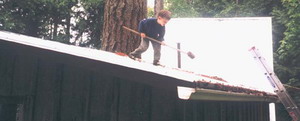ON EXPORTING FROM THE BRAIN
|
| If you think your brain needs some stretching buy a digital camera. I’m
sure that it does as much for your brain cells and neurons and whatever
you have up there as a New York Times crossword puzzle.
|
|
One of the things you come across is the concept of importing. From the
camera point of view it is exporting. Getting what’s inside outside.
|
|
During this same time I’ve been reading a book that Jean just finished
called “An Alchemy of Mind ─ The Marvel and Mystery of the Brain” by
Diane Ackerman. It’s a very readable book that even I can understand.
|
| One of the thoughts that has never occurred to me is that the human
species is the only one that exports the contents of its brain. We have
the ability to take something from inside our brain and store it
outside. A picture, for instance a painting on the wall of a cave,
tells something of what was inside the artist’s mind.
|
| When written
language developed it became possible to export ideas in the form of
tablets and scrolls and books. We have since gone to other storage
means. Now we can archive volumes of thoughts, ideas and discoveries in
computers. I can load everything now on my computer in a little Jump
Drive less than ½ by ¼ by 1 and ½ inches. All the
back pages I have ever written are there.
|
|
I am told that everything I’ve ever thought, heard, said, written or
imagined is stored someplace in my brain. There were many times,
especially during school exams, that I wondered where that information
was hiding. The ability to export all this information to an outside
storage place allows access that my brain doesn’t.
|
| Think of all the art and music we can now access that was once the possession of one mind.
|
|
So, there I was in Mexico, before and after long walks and swims along
the sandy beaches, huddled over the computer with my camera, trying to
work out the details of getting what was in my camera onto the
computer, then into some form that allowed me to export photos in such
a way that I could show others.
|
|
Those with more advanced camera and computer skills than me would not
have as much trouble. It reminded me of some students in classes I took
who seemed to easily understand, then recall, what they heard in
lectures or read in books. What seems easy to some is difficult for
others. Like I’m not good at remembering details like names of authors
or titles of books I’ve read. But I can usually remember and understand
the contents. I have to work at the details of exporting.
|
|
One course I took during my doctoral work involved an oral exam
covering eight fairly complex books on New Testament theology. It was a
situation in which I was most likely to come up with a frozen mental
screen. My friend and associate at the time, Stan Howard, had studied
enough hypnosis to help us prepare for that exam. We both got A’s in
the course, teaching me that the brain has the information if you can
retrieve it.
|
|
I have the same certainty that those great photos of memories I’d like
to keep can be retrieved from my camera and computer. What was in my
eye and thought can be exported, stored and recovered.
|
|
The idea that I can do this is inspiring. The idea that the human brain
is not confined to its own shell, but has desire and ability to export
contents beyond itself is amazing. We who write and teach and preach
and play music and paint pictures and transfer thoughts outside are
participating in an amazing and advanced trait in development.
|
|
How discouraging to think of thought police and media censors and
political entities and church officials who fear what the human brain
might think and wish to export.
|
|
Mystical is the faith of the psalmist who believed in God as able to
search and know me, knowing my thoughts from afar, acquainted with all
my ways, and before a word comes to my tongue, knows it altogether. No
exporting expertise required.
|
With that speculative faith exception, all other disclosure from my
brain depends on some means of exporting. That such means are part of
our human equipment is a major wonder. What would life be without it?
|
— Art Morgan, Mexico, May 4, 2005
|
